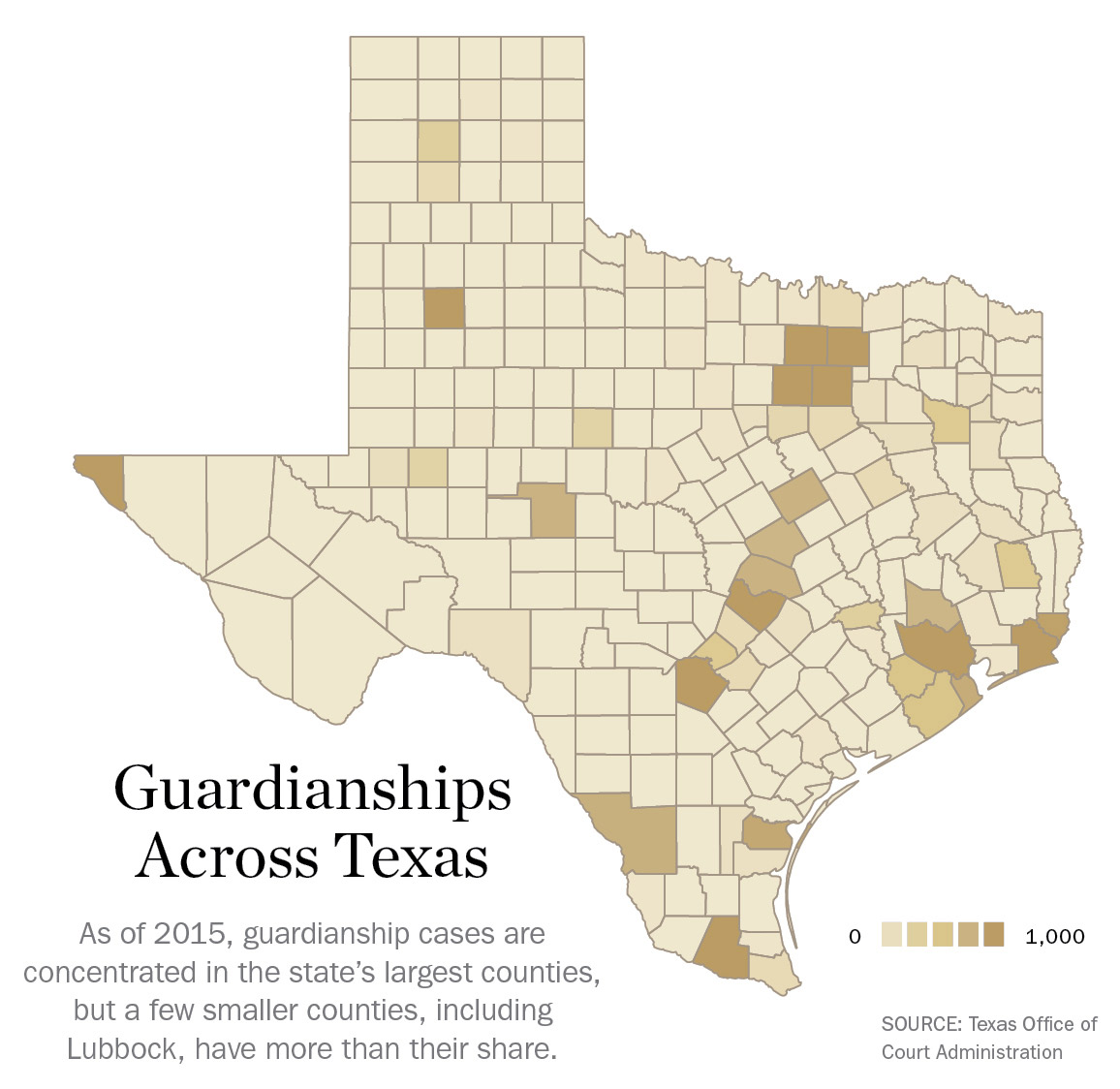An eye-opening story in the Observer on a subject many of us probably never think about.
Guardianship is the state’s last-ditch tool to protect people from neglect or abuse, and although it saves lives, it can be a blunt instrument. More than 53,000 Texans, most of them elderly or intellectually disabled, are under a guardianship today. Some could never make their own decisions; others, in the eyes of a friend or family member, have been making decisions that are dangerously wrong. In either case, the remedy is the same: Their legal rights transfer to a person of the court’s choosing. Proponents credit guardianship for celebrity success stories such as Britney Spears, whose life and career regained stability after her father won the legal authority to step in. But guardianship is in the news much more often for its abuses.
Guardianships are increasingly common, a trend typically attributed to an aging populace and scattered families. In Texas, the number of guardianships grew 60 percent from 2011 to 2015. Nearly $3 billion in personal wealth is under control of guardians in Texas, according to one recent estimate from state researchers. But even those who oversee the system and write its laws are only recently coming around to a troubling fact: In much of Texas, there is nobody watching these cases.
Ten large Texas counties run their own guardianship systems, with legally trained probate judges, court-appointed investigators and visitors — employees or volunteers who check up on people under guardianship — to ensure that a guardianship is still necessary and isn’t being used as a tool for abuse or theft. Dallas County, where Rosamond had lived for most of her life, has such a system. But she was in Lubbock County when her son Phil went to court. Lubbock County reported having 1,425 guardianships in August 2015, ranking eighth in the state both in total guardianships and guardianships per capita. The county has no system to ensure that guardians file required annual reports on the person they’re looking after, nor staff to check for evidence of fraud.
For the last 17 years, the man charged with running the local guardianship system has been Tom Head, a Republican best known outside Lubbock for his one fateful appearance on local TV. Though he hasn’t seen fit to pay for court staff to protect his most vulnerable citizens, Head has not been averse to raising taxes in the past. In 2012, to cite one popular example, he proposed a tax hike to protect Lubbock from President Obama and the United Nations.
“He is going to try to hand over the sovereignty of the United States to the U.N.,” Head told a local Fox affiliate. “What’s going to happen when that happens? I’m thinking worst-case scenario: civil unrest, civil disobedience, civil war, maybe. And we’re not talking just a few riots here and demonstrations. We’re talking Lexington, Concord, take up arms and get rid of the guy.”
In recent years Lubbock has come to epitomize the dangers of guardianship when nobody’s watching. As Rosamond Bradley recovered and tried in vain to have her rights restored, courts in Lubbock and nearby counties placed more than 50 people who did need protection in the care of strangers who lived hundreds of miles away, visited rarely, and walked off with their money. Lubbock has particularly weak oversight. Last fall, state investigators began a survey that is revealing a lack of accountability and potential for abuse all over Texas. Several years ago, Lubbock conducted a similar self-audit, but after briefly reckoning with its shortcomings, the county’s guardianship system appears as ill-equipped as ever.
Read the whole thing, it’s worth your time. As is so often the case, the problem is one part lack of money and one part lack of attention. Lubbock County is a particular trouble spot thanks in part to its lousy County Judge, but the Legislature bears some responsibility as well for the overall lack of oversight on guardianships despite the efforts of Sen. Judith Zaffirini to improve things. This is another one of those places where our state’s oft-expressed concern about the sanctity of life falls well short. Anyway, read it and see what you think. And if you have a family member who may be in need of a guardian – which let’s face it could be you or me some day – give some thought as to how you would want to see that handled. That’s your best line of defense against abuses happening.


As an attorney who works in the probate system, I have to concur. Guardianship is an expensive and onerous process, even when it is done correctly. Everyone—EVERYONE—should do some basic estate planning to avoid it. At a minimum, consider signing a “statutory durable power of attorney” and “medical power of attorney.” Those forms designate agents who can act on your behalf to make financial decisions and medical decisions, respectively, if you become incapacitated.